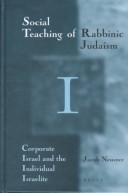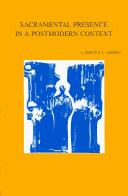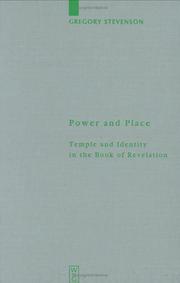| Listing 1 - 5 of 5 |
Sort by
|
Book
ISBN: 9042910941 2877236129 9789042910942 Year: 2001 Volume: 16 Publisher: Leuven Peeters
Abstract | Keywords | Export | Availability | Bookmark
 Loading...
Loading...Choose an application
- Reference Manager
- EndNote
- RefWorks (Direct export to RefWorks)
Sacraments --- Presence of God --- Sacramentals --- 265 --- Academic collection --- #gsdb4 --- Sacramenten:--algemeen --- Presence of God - Congresses. --- Sacramentals - Congresses.
Book
ISBN: 9042910828 9789042910829 Year: 2001 Volume: 42 Publisher: Leuven : Editions Peeters,
Abstract | Keywords | Export | Availability | Bookmark
 Loading...
Loading...Choose an application
- Reference Manager
- EndNote
- RefWorks (Direct export to RefWorks)
In the postmodern age the question of the way in which we 'think sacrament' has acquired particular prominence, not least because it touches the core of all theology. Sacrament cannot be reduced to metaphysical concepts. It is, instead, 'enfleshment', the incarnation of transcendence in a way that moves us in an unparalleled way. The problem of 'sacramental presence', and what it reveals about the Christian understanding of God, the world, and the believing subject, is the subject of this volume. The book is divided into four parts: (1) 'Approaching Sacrament in a Postmodern Age: Questions of Method', (2) 'Yesterday Revisited: Recovering the Past in the Face of the Challenges of the Postmodern Age', (3) 'Today's Imperative: Uncovering the Transformative Power of Sacrament in a Postmodern Age', and (4) 'Tomorrow's Possibilities: Discovering New Loci of Sacramental Presence in a Postmodern Age'. (Peeters)
Aanwezigheid van God --- Dieu--Présence --- Dieu--Transcendance --- God--Aanwezigheid --- God--Presence --- God--Trancendentie --- God--Transcendence --- Presence of God --- Présence divine --- Sacramenten --- Sacraments --- Sacrements --- Transcendance de Dieu --- Transcendence of God --- Transcendentie van God --- God (Christianity) --- Presence of God. --- Transcendence of God. --- Sacraments. --- Omnipresence. --- #GGSB: Sacramenten --- 265 --- 230*705 --- God --- -Presence of God --- #gsdb4 --- Divine transcendence --- Ecclesiastical rites and ceremonies --- Church --- Grace (Theology) --- Rites and ceremonies --- Schechinah --- Shechina --- Shechinah --- Shekhinah --- Shekina --- Shekinah --- Metaphysics --- Misotheism --- Monotheism --- Religion --- Theism --- Sacramenten:--algemeen --- Post-moderne theologie. Postmoderne theologie --- Omnipresence --- Transcendence --- Presence --- Conferences - Meetings --- 230*705 Post-moderne theologie. Postmoderne theologie --- Omnipresence of God --- Attributes --- God (Christianity) - Omnipresence. --- Transcendance (philosophie)

ISBN: 9789004495418 9789004122611 Year: 2001 Publisher: Leiden; Boston : BRILL
Abstract | Keywords | Export | Availability | Bookmark
 Loading...
Loading...Choose an application
- Reference Manager
- EndNote
- RefWorks (Direct export to RefWorks)
The systematic and orderly presentation of the Halakhah, normative law, of Rabbinic Judaism in its formative age makes its principal statements in response to a program of social reconstruction; it speaks through the details of norms of law about the community, Israel. Rabbinic Halakhah lays out a social philosophy of an coherent and encompassing character. Part 1: Corporate Israel and the Individual Israelite In the first part of the project, on Corporate Israel and the Individual Israelite we ask where and how the Halakhah sorts out the relationships of the individual and the community: the realm of responsible action and particular responsibility assigned by the Halakhah to each. Prophecy, from Moses forward, and the Halakhah from the Mishnah onward, concur that the condition of "all Israel" dictates the standing of each individual within Israel, and further concur that each Israelite bears responsibility for what he or she as a matter of deliberation and intention chooses to do. If individuals were conceived as automatons, always subordinated agencies of the community, or if the community were contemplated as merely the sum total of individual participants, a particular social teaching would hardly demand attention. But Scripture, continued in the Mishnah, Tosefta, the two Talmuds, and Midrash, insists that Israelites are individual responsible for what they do, and further that corporate Israel on its own, not only as the sum of individual actions, forms a moral entity subject to judgment. So these are the governing questions: How to sort out these intersecting matters, then, the obligations of the community, the responsibilities of individuals? How does the social teaching of Rabbinic Judaism hold together doctrines of individual obligations to Heaven and mutual responsibilities, on the one side, with all Israel¹s commitments and public convictions, on the other? Part 2: Between Israelites Part 2 turns to relationships between Israelites, with particular attention to those that require resolving conflict. Once the law recognizes not only Israelites but the integrity of corporate Israel, how does it regulate relationships within the framework of that corporate community? By regulating relationships the sages will have understood, relationships of competition, contention, and conflict. Those of collaboration, consensus, and cooperation require no regulation on the part of constitutive law; they regulate themselves by their nature: people keep rules. Then at issue are where the corporate community intervenes to protect its interests in relationships between and among individual Israelites, and how it does so. The exposition then follows the laws presentation of those relationships as integral to the larger system of Rabbinic Judaism and its plan for its Israel's public life, hence, once more, the focus on large constructions, category-formations that are integral to the main beams of the Halakhic system and structure. Part 3: God's Presence in Israel Part 3 raises the third and final question of the social order: God's role in society. For Rabbinic Judaism to be "Israel" means to live in God's kingdom, under God's rule, in a very particular way. That imperative addresses not individuals alone or mainly but, rather, corporate Israel, that is, the entire social order. It encompasses not merely feelings or attitudes but registers in the here of tangible transactions and in the now of workaday engagements, not only in some distant time. The generative question of this third and concluding part of the study of the social teaching of Rabbinic Judaism, is this: What, precisely, does God's active presence mean in the system of the social order put forth by the Halakhah?.
Rabbinical literature --- Conflict management --- God (Judaism) --- Interpersonal relations --- Jewish families --- Jewish sociology --- Judaism and the social sciences --- Presence of God --- Social sciences --- Religious aspects --- Judaism --- Conduct of life --- History and criticism --- Philosophy

ISBN: 9058671860 9042910674 2877235971 9789042910676 Year: 2001 Volume: 160 Publisher: Leuven Peeters
Abstract | Keywords | Export | Availability | Bookmark
 Loading...
Loading...Choose an application
- Reference Manager
- EndNote
- RefWorks (Direct export to RefWorks)
Sacraments --- Presence of God --- Catholic Church --- Congresses. --- #GGSB: Sacramenten --- 265 --- Academic collection --- #gsdb4 --- Sacramenten:--algemeen --- Conferences - Meetings --- Ecclesiastical rites and ceremonies --- Church --- Grace (Theology) --- Rites and ceremonies --- God --- Schechinah --- Shechina --- Shechinah --- Shekhinah --- Shekina --- Shekinah --- Presence --- Omnipresence --- Doctrines --- Sacramenten --- Church of Rome --- Roman Catholic Church --- Katholische Kirche --- Katolyt︠s︡ʹka t︠s︡erkva --- Römisch-Katholische Kirche --- Römische Kirche --- Ecclesia Catholica --- Eglise catholique --- Eglise catholique-romaine --- Katolicheskai︠a︡ t︠s︡erkovʹ --- Chiesa cattolica --- Iglesia Católica --- Kościół Katolicki --- Katolicki Kościół --- Kościół Rzymskokatolicki --- Nihon Katorikku Kyōkai --- Katholikē Ekklēsia --- Gereja Katolik --- Kenesiyah ha-Ḳatolit --- Kanisa Katoliki --- כנסיה הקתולית --- כנסייה הקתולית --- 가톨릭교 --- 천주교 --- Sacraments - Catholic Church - Congresses. --- Presence of God - Congresses.

ISBN: 3110170086 3110880393 9783110880397 9783110170085 9783110170085 Year: 2001 Volume: 107 Publisher: Berlin de Gruyter
Abstract | Keywords | Export | Availability | Bookmark
 Loading...
Loading...Choose an application
- Reference Manager
- EndNote
- RefWorks (Direct export to RefWorks)
Archaeological, epigraphic, numismatic, and historical research is used to illuminate the meaning and function of temples in both Jewish and Greco-Roman cultures. This evidence is then brought into a dialogue with a literary analysis of how the temple functions as a symbol in Revelation. Die Bedeutung und Funktion von Tempeln sowohl in der jüdischen wie auch der griechisch-römischen Kultur wird mittels archäologischer, epigraphischer, numismatischer und historischer Forschung erhellt. Die Ergebnisse werden dann in einer Textanalyse der biblischen Johannesoffenbarung angewendet. Leitend ist dabei die Fragestellung, wie in der Offenbarung auf den Tempel als bedeutungsreiches Symbol zurückgegriffen wird.
Temple of God --- 228 --- House of Yahweh --- Christian art and symbolism --- Holy Spirit --- Jewish art and symbolism --- Mystical union --- Presence of God --- Apocalyps. Boek der Openbaring van Johannes. Apocalyptiek --- Symbolism --- Bible. --- Abūghālimsīs --- Apocalipse (Book of the New Testament) --- Apocalisse (Book of the New Testament) --- Apocalypse (Book of the New Testament) --- Apocalypse of John --- Apocalypse of St. John --- Apocalypsis Johannis --- Apocalypsis S. Johannis --- Apokalypse (Book of the New Testament) --- Apokalypsin --- Book of Revelation --- Johannes-Apokalypse --- Johannesapokalypse --- Johannesoffenbarung --- Offenbarung des Johannes --- Revelation (Book of the New Testament) --- Revelation of St. John --- Revelation of St. John the Divine --- Revelation to John --- Ruʼyā (Book of the New Testament) --- Sifr al-Ruʼyā --- Yohan kyesirok --- Criticism, interpretation, etc. --- Temple of God. --- Apokalipsa św. Jana --- Apokalipsa świętego Jana
| Listing 1 - 5 of 5 |
Sort by
|

 Search
Search Feedback
Feedback About UniCat
About UniCat  Help
Help News
News